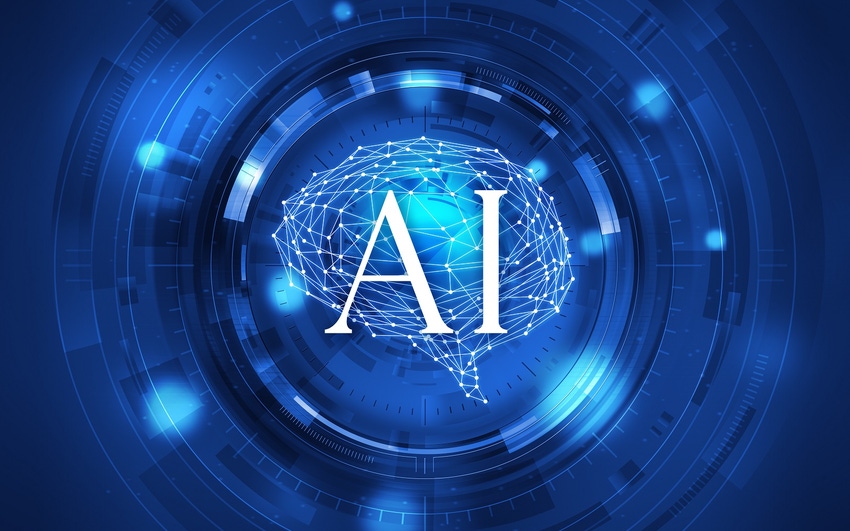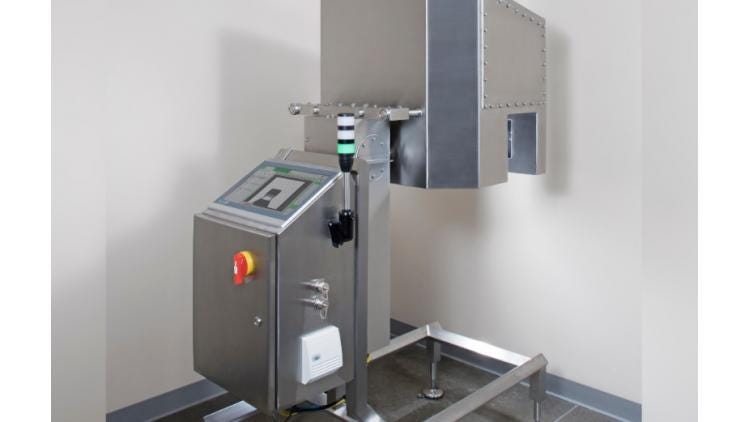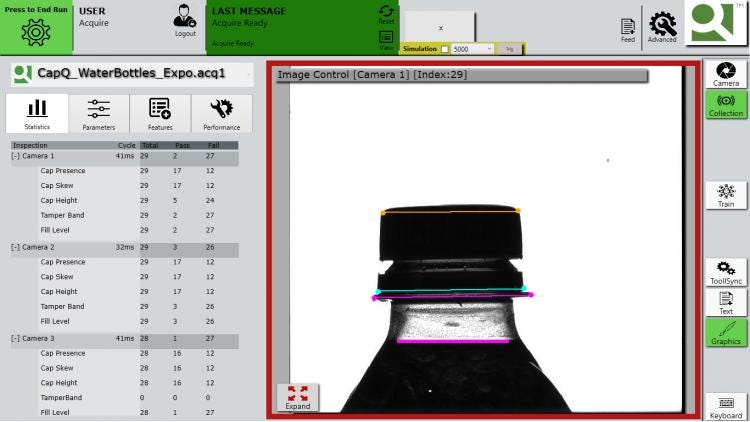Artificial intelligence in packaging: CapQ vision inspection
June 25, 2019

AI's unique OEE performance-enhancing, high-speed boost reduces setup times, false rejections and scrap for full-surround cap inspection.
There’s more to the CapQ Vision Inspection system from Acquire Automation than meets the eye.
Sure, it’s capable of assessing capped beverage and consumer good containers using 360° inspection to check and confirm cap height, cap skew and raised or missing cap as well as the integrity of the tamper-evident band. And it also confirms that the correct color cap is on the packaged product while simultaneously inspecting for fill level.
Also, the 100% inspection detects errors early for quicker correction, minimizing the number of rejects, and by monitoring the filling process, CapQ also helps manufacturers conform to the requirements of 21CFR129.80
And there’s the boilerplate features of stainless steel Nema 4X/IP65 enclosure, and the fact that it fits over an existing conveyor along with a height adjustability that feature ensures quick and easy integration into existing production lines.

But what sets it further apart from other vision systems and in fact nearly all other packaging systems is the integration of artificial intelligence (AI) into the CapQ inspection process. AI enables the CapQ system to ignore water droplets and plastic fragment shedding that can skew measurement results, leading to false rejects. This software advancement and the easy-to-use operator touch screen interface make the CapQ system a pioneering quality inspection device.
Andrew Eddleman, product manager, responds to Packaging Digest’s questions specific to this leading-edge information processing technology.
Why use artificial intelligence?
Eddleman: Acquire was challenged by the market to innovate its high-performing cap inspection platform by reducing the false rejection results typically found in traditional machine inspection technology for beverage plants. Acquire responded to this challenge be exploring non-traditional machine vision technology—AI. The AI technology, when combined with Acquires’ Spectrum platform software, creates a new technology, False Rejection Suppression Technology. This enables the user to train in examples of product previously false rejected by machine vision and now properly and accurately inspect them—increasing overall line Overall Equipment Effectiveness (OEE), customer profits and scrap reduction.
What is the specific nature of AI?
Eddleman: We use AI technology to supplement our industry leading platforms and products. When AI is enabled, this allows for complicated data sets to be processed at high speeds (use cases above 1,000ppm). The usage of AI within our standard offerings reduces false rejection rates when compared to standard vision algorithms.
What’s the benefit for customers and operators?
Eddleman: There are three main benefits:
Uptime/Reliability /Overall Efficiency - Previous machine vision systems that might have failed due to product unpredictability or line changes can incorporate variability into the model. This leads to less false failures or false accepts and allows for more up time.
Faster setup time for new product variations even if the products presented are for the first time.
Faster updates to existing programs and recipes based on new line conditions.

What’s been the interest specific to the system’s AI capability?
Eddleman: The interest is in how this technology can handle deviations in product presentation or environmental items that typically cause high failure within traditional vision inspection solutions. Clients want to understand how this affects the bottom line and have been quite interested in the fast ROI of moving to an AI supplemented solution.
Also Acquire has always been a solution provider by combining intimate knowledge of the customers process and industry leading technology together. Our interest is in strengthening our position as technology leader by continuing to create new success stories at the same record pace in the packaging industry. AI has been a part of this momentum for several years now and continues to solve vision applications where traditional machine vision may have limitations.
What’s a common question about AI that you’ve been asked?
Eddleman: Customer concerns especially within regulated industry is how to validate such a technology. This is addressed with the methods used in deployment. The system is programmed once before validation and the algorithm does not change after the system is installed. Our software is all under source-code control.
Another question is, what is AI capable of and how will it impact my inspection/quality program? Acquire has responded to this question by offering engineering evaluations either by using actual customer images, taking images, or creating a standard system for on-line evaluation at a customer’s plant. From our years of experience these have been incredibly successful and added immediate proven value to the customer.
What further activity do you foresee for AI in your machinery or in packaging machinery in general?
Eddleman: We see an increased usage for AI technology to accomplish the following:
Removal of the uncertainty in manual inspection on applications that had previously not been possible;
Reduction of false rejection within manufacturers that currently experience a high false reduction rate (improvement of performance and efficiency);
Simplification of new product setup;
Increased flexibility in vision solutions to adapt to changing customer needs.
Anything else to point out?
Eddleman: This technology is ideal for defect detection, texture and material classification, assembly verification and deformed part location and character reading, including distorted print.
AI supplemented solutions learn by example—like that of a human. This means real-world conditions can be taught to the system. The cool part here is the system never forgets!
___________________________________________________________________________________
Much food for thought for packaging will be found at PackEx Toronto June 4-6, 2019, where innovative ideas in containers and design, the latest machinery and automation solutions and free education at Centre Stage will be available. For more information, visit PackEx Toronto. ___________________________________________________________________________________
You May Also Like


